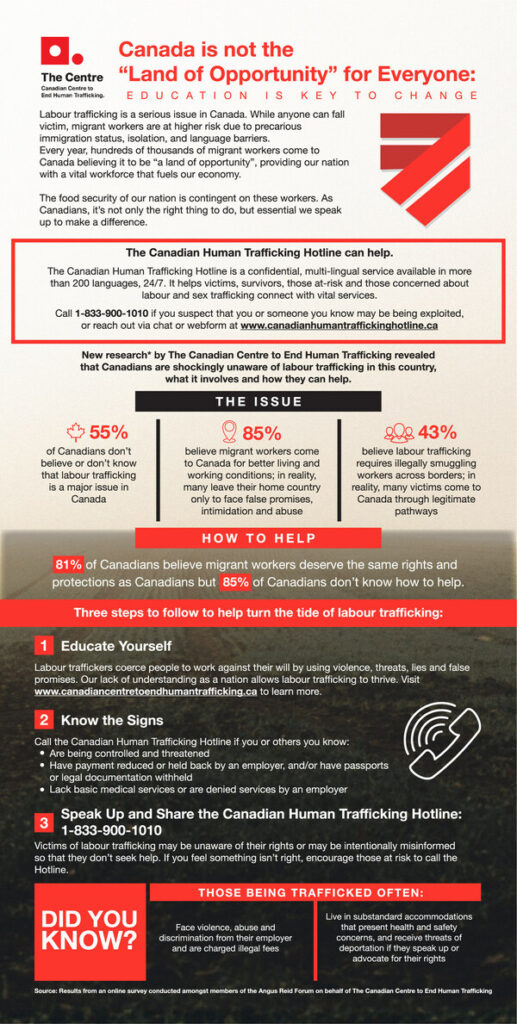Canada’s food security depends on migrant workers, yet they are at the highest risk of Labour Trafficking
TORONTO, Feb. 9, 2023 – Every year, hundreds of thousands of migrant workers come to Canada, believing it to be “a land of opportunity.” They provide the nation with an essential labour force that fuels our economy. These workers expect to be treated fairly by their employers. While many are, a growing number of migrant workers, particularly those who help grow and harvest our food, are not. Eighty-five per cent of Canadians believe migrant workers come to Canada for better living and working conditions*, however in reality, many leave their home country only to face false promises, intimidation, and abuse.
Labour trafficking is a serious issue in Canada. While anyone can be a victim of labour trafficking, migrant workers are at higher risk due to precarious immigration status, isolation, and language barriers. New research by The Canadian Centre To End Human Trafficking (The Centre) – a national charitable organization dedicated to ending human trafficking – reveals that despite the pervasiveness of labour trafficking, more than half of Canadians (55 per cent) either don’t believe or don’t know that it is a major issue in Canada. This lack of knowledge exacerbates the problem.
“Trafficked persons are lured to Canada with promises of good-paying jobs, and access to opportunities for themselves and their families. However when they arrive here, they are forced to work long hours under unsafe and very poor working conditions for little or no money,” explains Julia Drydyk, Executive Director, The Canadian Centre to End Human Trafficking. “These workers often don’t realize they have rights. Many feel threatened and isolated, so they do as they are told. We know Canadians want to help – 93 per cent of Canadians support the fair treatment of migrant workers – but we also know that 85 per cent don’t know how to make a difference. Being able to identify labour trafficking is the first essential step to stopping it.”

This National Human Trafficking Awareness Day (February 22), The Centre is informing Canadians about the issue of labour trafficking and announcing an upcoming educational campaign aimed at migrant workers. Launching in April when seasonal work begins, the multi-faceted campaign will help migrant workers understand their rights and raise awareness of The Centre’s Canadian Human Trafficking Hotline.
The Canadian Human Trafficking Hotline is a confidential, multi-lingual service available in
more than 200 languages, 24/7. It helps victims, survivors, those at-risk and those
concerned about labour and sex trafficking connect with vital services.
If you suspect that you or someone you know may be being exploited call
1-833-900-1010 or reach out via chat or webform at www.canadianhumantraffickinghotline.ca
Canada’s Food Security Depends on Migrant Workers
Labour trafficking can occur in almost any industry, from construction to hospitality. Annually, the agricultural sector employs the most temporary foreign workers, with general farm workers making up 56 per cent of this workforce, followed by nursery and greenhouse workers at 15 per cent1. Migrant workers in agriculture are more vulnerable to exploitation due to language barriers and isolated working or living conditions.
Canadians value our agricultural industry; 96 per cent of those surveyed believe it’s important to support Canadian farming, and another 96 per cent believe Canadians deserve access to affordable, nutritious food. What many don’t realize is that Canada’s food security rests on the backs of migrant workers, therefore it is not only compassionate, but essential that we support this vital workforce.
Three Steps Towards a Solution
Step 1: Educate Yourself
Labour traffickers – including recruiters, contractors, employers and others – can coerce people to work against their will by using violence, threats, lies and ‘debt bondage’. Those being trafficked often:
- Live in substandard living accommodations that present health and safety concerns
- Complete work outside of their contractual terms
- Have their pay reduced or held back by their employer
- Pay for services (i.e. travel to Canada) that employers are legally required to cover
- Receive threats of deportation if they speak up or advocate for their rights
- Have their passports and/or other legal documentation taken away
- Face discrimination from their employer
Our lack of understanding as a nation allows labour trafficking to thrive, so education is essential. The research revealed some common misperceptions:
- 43 per cent of Canadians believe that labour trafficking requires illegally smuggling workers across borders. Another 25 per cent don’t know if that’s the case. In reality, many victims come to Canada through legitimate pathways.
- 61 per cent of Canadians believe or don’t know if migrant workers must pay a portion of their salary back to their employer, to cover the cost of bringing them to Canada. This is illegal, yet many traffickers demand “debt repayments” and steal wages from unsuspecting workers.
Learn more about the issue at The Centre’s website.
Step 2: Know the Signs
Call the Canadian Human Trafficking Hotline if you or people you know:
- Are being controlled by others and escorted at all times.
- Have had a passport or ID documents confiscated by an employer.
- Express fear and intimidation through facial expressions or body language.
- Have bruises or other signs of physical abuse, including malnourishment.
- Lack basic medical services or are being denied services by an employer.
Find a more robust list of signs of human trafficking at The Centre’s website.
Step 3: What Can you Do to Make a Difference? Speak Up and Share the Canadian Human Trafficking Hotline
Oftentimes, victims of labour trafficking may be unaware of their rights or may have been intentionally misinformed so that they don’t seek help. If you feel something isn’t right, speak up and encourage those at risk to call the Hotline at 1-833-900-1010.
Independent of the police or the government, the Hotline has specialized protocols and partners with over 900 service providers nationwide, allowing staff to connect callers with localized expertise and services that meet their unique needs, such as legal clinics, legal services and migrant rights networks. The Hotline may also offer additional referrals to community partners equipped to meet basic housing needs, food, clothing, etc. Change truly can begin with just one call.
“For a large majority of migrant workers, not knowing who to trust, where to go, and how to access information about their rights are major barriers,” adds Ms. Drydyk. “Lack of knowledge leaves migrant labourers susceptible to exploitation. And lack of knowledge on the part of Canadians allows this abuse to flourish. As a nation that depends on these essential workers, we need to do better.”
About The Canadian Centre to End Human Trafficking
The Canadian Centre to End Human Trafficking is a national charity dedicated to ending all types of human trafficking in Canada. In 2019, the organization launched the Canadian Human Trafficking Hotline, a 24/7, multi-lingual service that can be accessed via phone, chat, webform, and email. The Centre also operates as the national “backbone” organization working on this issue, working with governments, companies and service providers to facilitate collaboration, identify best practices, and advance change towards ending trafficking in our country. For more information on The Centre, please visit www.canadiancentretoendhumantrafficking.ca.
For more information, or to speak with a representative from The Canadian Centre to End Human Trafficking, please contact:
Danee Wilson
Consultant
Strategic Objectives
Tel: (437) 917-9445; Email: dwilson@strategicobjectives.com
Aziz Froutan
Communications Manager
The Canadian Centre to End Human Trafficking
Tel: (647) 714-2527; Email: afroutan@ccteht.ca
| * Survey Methodology: Survey of Canadian adults (n=1,514). In-field: January 24 – 26, 2023. Margin of error: +/- 2.5 percentage points at a 95% confidence level. The sample was balanced and weighted on age, gender, region and education. |
| __________________________________________ |
| 1 Employment and Social Development Canada’s (ESDC) Labour Market Information Assessment (LMIA) System. Data from January to June 2022. |
